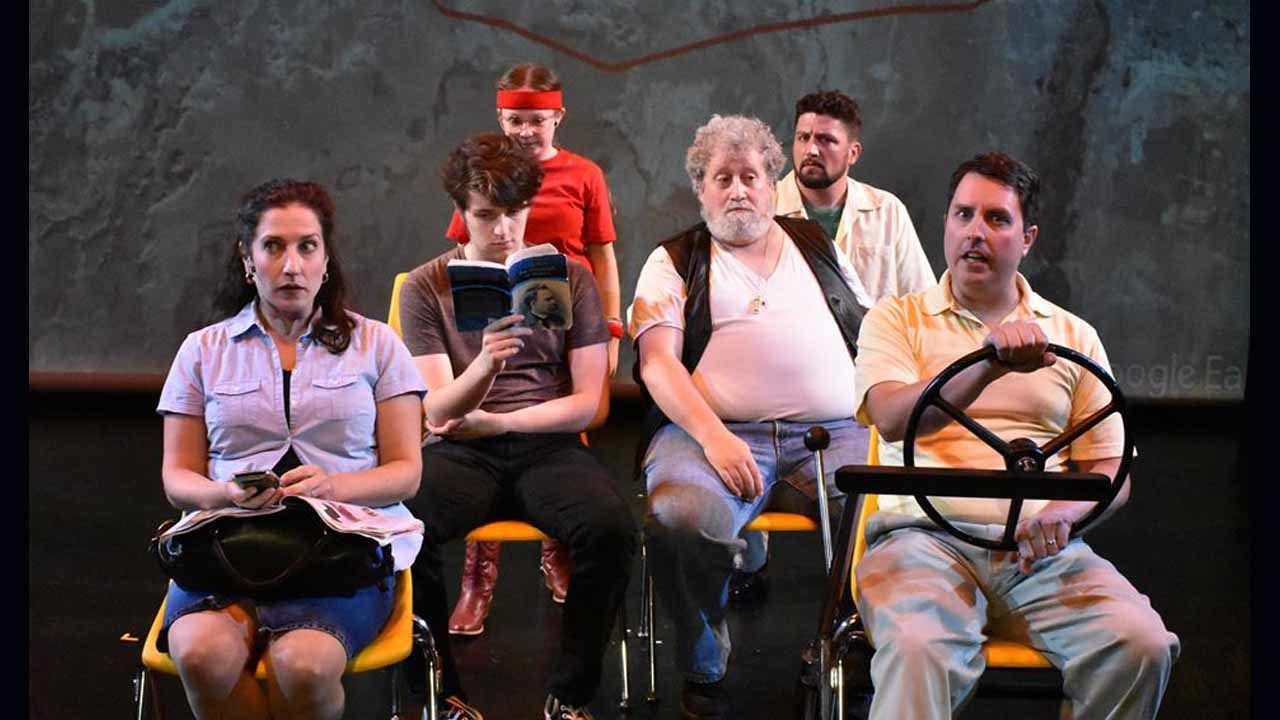MTM's "Little Miss Sunshine" is a Big Winner
It’s no secret that Broadway has been looking to Hollywood for inspiration for new musicals for decades. Examples of the genre include SpongeBob SquarePants, Mean Girls, Pretty Woman, Legally Blonde, Billy Elliot, and the just-opened music and dance spectacular Moulin Rouge. Sometimes they translate to the stage beautifully (Waitress, An American In Paris) and sometimes they really don’t (High Fidelity, Urban Cowboy).
In the case of Little Miss Sunshine, composer and lyricist William Finn has made the most of the aggressively quirky, Oscar-winning family dramedy from 2016, and created a musical that is just as enchanting as the movie, if not moreso. In fact, since many of the characters in the story are experiencing huge crises, it’s the perfect vehicle for songs overstuffed with emotion. The show is so well-crafted, it’s puzzling that it didn’t find greater commercial success. Music Theatre of Madison’s excellent production of this gem, which runs through August 25th in the UW Play Circle at the Wisconsin Union, shows once again how adept Director/producer Meghan Randolph is at making odd little musicals shine.
The story follows the movie closely—an awkward little girl dreams about becoming a beauty pageant queen, and when she gets the call that she has qualified for the Little Miss Sunshine competition, she is elated. The catch is the contest is in a couple of days, it’s two states away, and her family is in no position to make the trip. Finances are dire since the father of the family lost his job. Tempers are running high since Grandpa was kicked out of his retirement community for bad behavior. Mom’s suicidal brother has also recently moved in after losing the love of his life and his job as an English professor. Moody teenage son Dwayne has take a vow of silence until he achieves his goal of becoming a test pilot at the Air Force Academy and Mom is completely exhausted from trying to keep this motley crew afloat. So obviously what these people need is a long road trip in an unreliable vintage Volkswagen bus.
Right away the musical dives in to the overstressed, bitter world view of the main characters with “The Way of the World.” Its cynical lyrics include “Dreams that shouldn’t die, die; hearts that shouldn’t break, break into pieces,” and “if you think life improves, that’s not how the earth moves.” The darkly comic tone is the through-line of the score. It raises the material from one long therapy session to a cathartic, and ultimately uplifting story of a broken family reaching out to fix each other, in big and small ways.
From the first few bars, it’s also obvious that the production’s core cast members are accomplished actors as well as vocalists. Harmonizing beautifully, the small ensemble fills the space with strong, balanced voices and a clear emotional point of view. As parents Richard and Sheryl Hoover, Kevin Blakeslee and Liz Griffith have great chemistry. His insecure, struggling self-help guru, who would rather not have difficult conversations is a great foil for her resolved pragmatist who is just barely keeping it together. Their lovely flashback duet “Always Make Me Proud” demonstrates that they’ve always had different approaches to life, but they also began their relationship with a genuine connection.
As Sheryl’s struggling brother Frank, Paul Milisch is a delight. Obviously uncomfortable in his own skin and reeling from personal and professional setbacks, he projects real honesty about the character’s disappointments, as well as the bandages that cover up each wrist. When Frank encounters his ex-boyfriend at a rest stop, along with the fellow Proust scholar who has replaced him in the relationship, Milisch allows all the cracks in his character to show through the hilarious “How Have I Been?” Special kudos goes to J. Adam Shelton for creating the ultimate academic snob, who is so easy to hate as Frank’s rival.
Bart Terrell gives the always inappropriate Grandpa the right rough edges, but also a genuine soft spot for his granddaughter Olive. His “Happiest Guy in the Van,” is a fun riff on advice a mother would never give her child, from the perspective of someone who has lived and loved to the extreme. And Cole Pantano shows great skill in both of sullen Dwayne’s phases — one verbal and one silent. He communicates a great deal in his rolled eyes, slouches, and vigorous head shaking in the first half of the play. His first spoken line is also one of the comic highlights of the play.
But the star of the story is little Olive, played by Abigail Dalton. A natural onstage, her deadpan delivery frequently breaks the tension in scenes where things go from bad to worse for family members. And her quieter moments, showing affection for her brother and grandfather are achingly genuine. Plagued by visions of the “mean girls” who tell her she could never win a beauty pageant, audiences can almost see Dalton’s heart sink. But they also cheer on her unorthodox performance of the suggestive “Shake Your Badonkadonk” when she finally makes it to the pageant stage.
Since much of the story takes place inside a cramped van, the set consists primarily of matching yellow chairs and a large Google map projection that charts the family’s progress from New Mexico to California. (Projection design by Eric Holmer.) This mostly works, although sudden jerks of the video are jarring and when we’re not in navigation mode, a blank monochromatic backdrop makes the stage feel bare. Choreography by Marsha Heuer felt stiff and unimaginative, particularly in comparison to the repeatedly entertaining “dance” the family goes through each time they have to jump into the moving van, after the clutch goes out.
But those are very small complaints for a production that does so much well, and is packed with so much heart.
